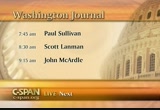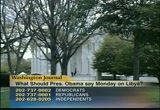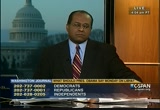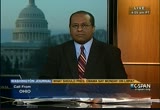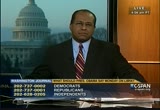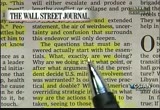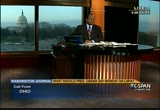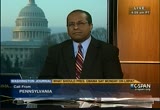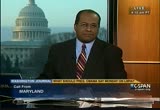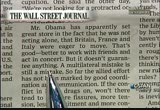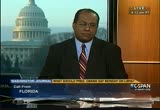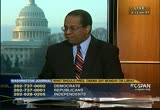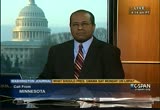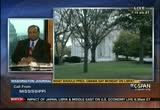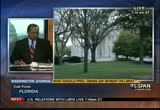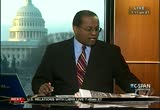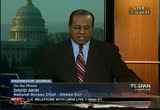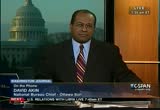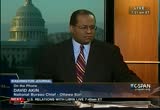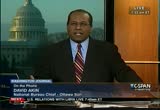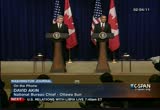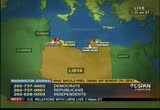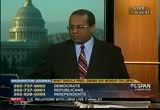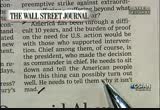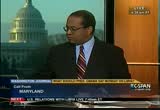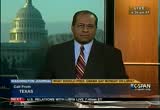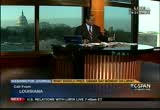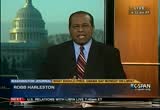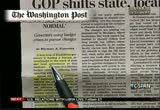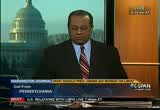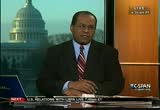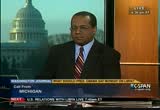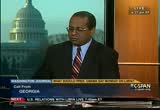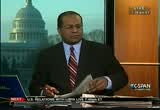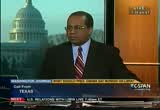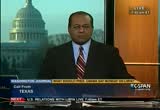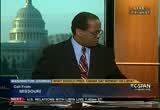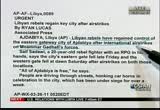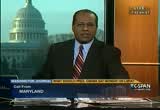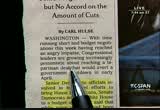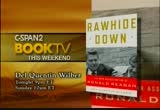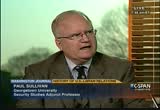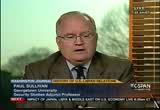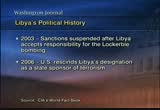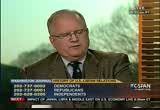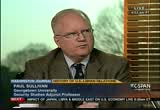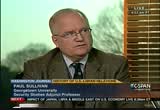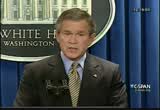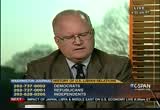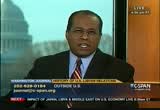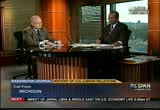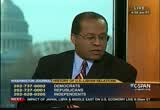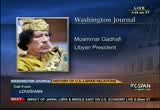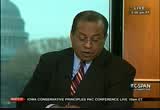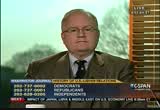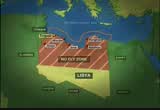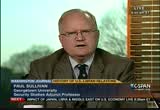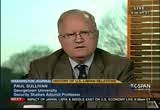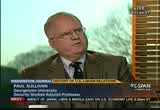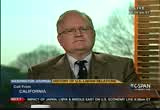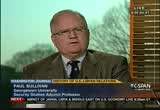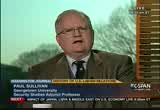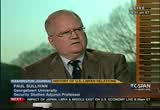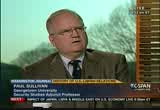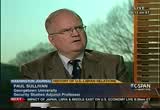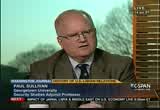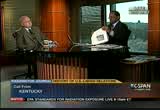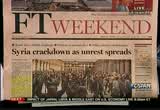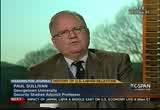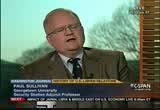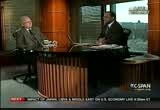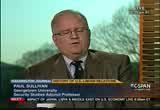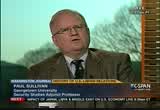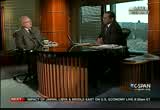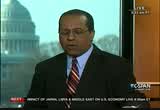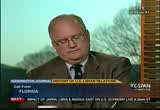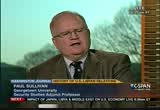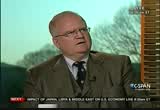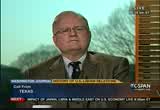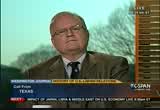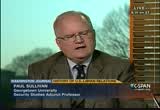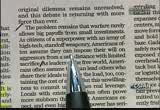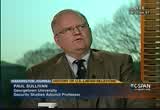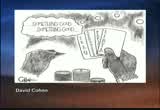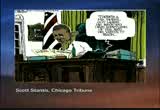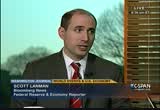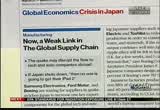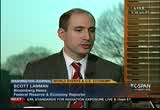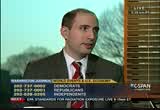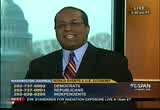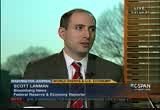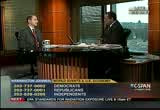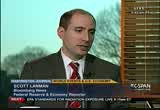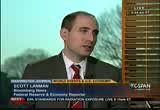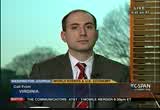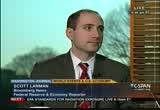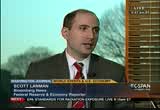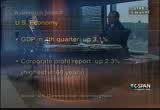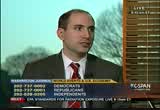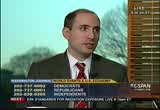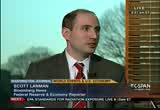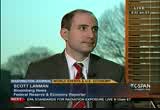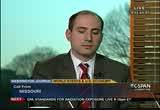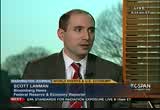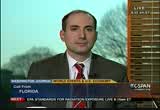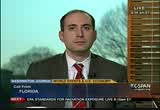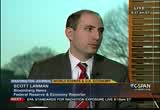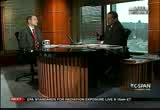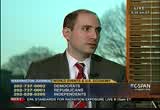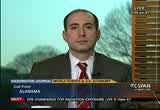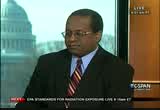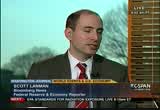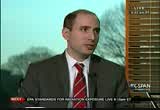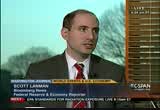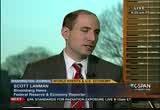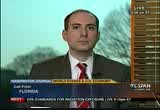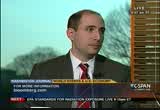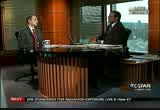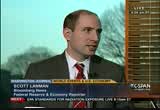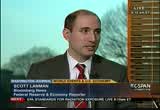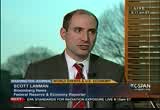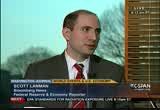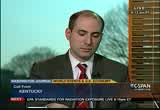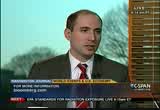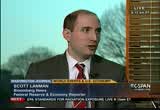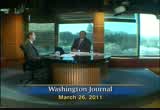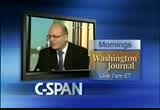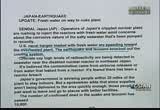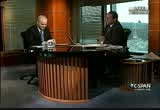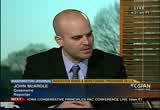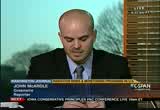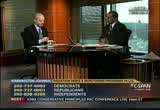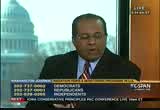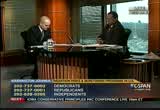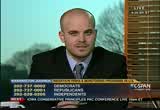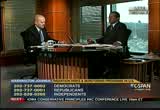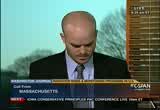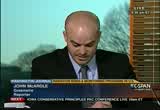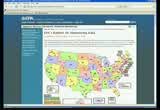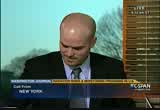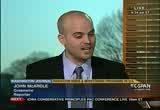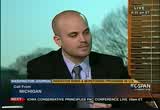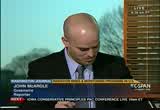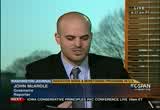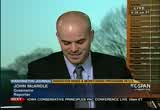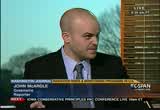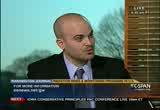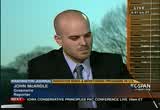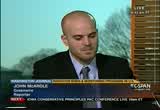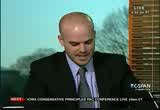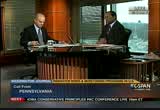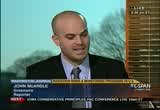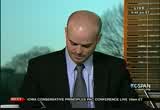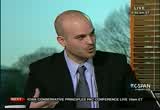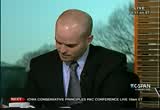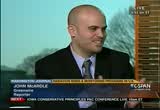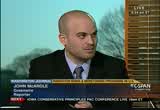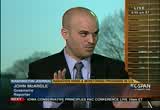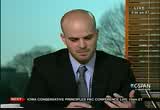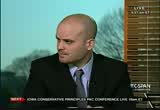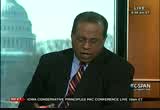tv Washington Journal CSPAN March 26, 2011 7:00am-10:00am EDT
7:03 am
7:04 am
president i want him to tell us why we're going into libya and not the sudan and not bahrain. i think it's un:tionable to open another front when we're spending millions a day on iraq and afghanistan and 50% of our revenue goes to defense. host: the sudan would be another front, too. caller: we could help solve that with humanitarian aid. with the cost in fossil fuels, if we paid the actual cost that fossil fuels cost us, we would pay $12.50 a gallon for gasoline because these wars are about oil. what i'm saying is if he's the innocent president then why doesn't he talk about -- intelligent president why doesn't he talk about the bahrain or sudan? he's doing it for oil just like the last -- just like the iraq war. and i think we need to question why we're doing these things. if we want to help people
7:05 am
resisting and trying for democracy, let's do that. but let's not be hidden about our agenda. let's be explicit about what the reason is. host: let's move on to ed in columbus, ohio on our line for independents. what should the president say on monday? caller: yes. i'm waiting to see what he's going to say. i'm appalled at the cost of what this is going to be when we for months have been listening to republicans and democrats and everybody in washington talking about how it's -- how we have to balance our budget. and but yet we're going and spending all this money just i'm just amazed at how this continues to happen over and over and over again. host: so you want to hear something from the president that justifies the cost? caller: just fiss -- justifies
7:06 am
the cost because we've been looking for the economy to turn around and turn around, and it's not turning around. i'm a contractor and i see how many foreclosed houses there are and my business actually has come to a complete halt. when that money could have been used as the stimulus package it could have been used to help people who are really having it rough right now. host: james in lakeland, florida on our line for democrats. what should the president say on monday regarding u.s. involvement in libya? caller: well, i don't remember reagan addressing the nation on why he would bomb libya. before we knew it, they were bombed. he went after gaff if i. he almost got him. before that we had a president of the united states who
7:07 am
7:08 am
worl. caller: at this point i only think balancing -- what they're going to do to balance the budget is going to help. i don't think they're taking it seriously. so we might as well -- libya. because in all these other countries for no real reason. like this is a legitimate cause for us to not invade but help citizens fighting for freedom. like we should be in sudan, we should be in all those countries. how much moneyeyre we spending on the countries that aren't really in need of us? we are essentially occupying them. host: so what do you want to hear the president say on monday? what's going to allay your fears or concerns? caller: i don't think i would believe it. not just the president but any of the politicians. what they say is not going to be what they do anyway. i've just completely lost faith . host: on our line for republicans. go ahead ellen.
7:09 am
caller: good morning, and thank you c-span. i think president obama is the most inept president. everything he does is wrong it's late. i don't understand him at all. host: so is there anything that he can say to change your mind about the way you feel about him now? caller: well, i wish he would stand up like a man. boy, oh boy he just is not taking the stand he should as president. and he's wishy washy. good grief. host: in baltimore maryland, dorothy, go ahead. caller: good morning. thank you for c-span. host: what should the president say to the country when he addresses them on monday regarding u.s. involvement in libya? caller: i think he should let them know the reason he went to -- the reason he had to get the
7:10 am
get everything straight because regardless of what he does or says democrats republicans independents, they are not going to be satisfied. enough of this is enough. they said they don't have money. they've got enough money to start this. the republicans, have enough money to knock down people that are trying to help the little people. so that's a bunch of bull that they don't have money. host: more from peggy noonan.
7:12 am
republicans. caller: thank you for taking my call. love your show stpwhroofment what do you think the president should say on monday regarding the involvement in libya? caller: i believe we are our brother's keeper and that we should stand up and not worry about what germany does and france and what they think about it. the united states in the long run is going to benefit by protecting citizens. and we need to stand up and not care what anybody else says and just spend the money sacrifice some lives if we have to and take care of it. and toipt say something off subject. last week you had a lady call in sunday with a very racist comment. and i think c-span should discourage that. and let's leave this all open for everybody to talk and not say racist things.
7:13 am
if i would have said what she said, my parents would have punched me in the nose. host: well, hopefully there won't be any violence in your house. we appreciate your comments. next up is wyoming minnesota. on our line for independents. go ahead. caller: hello. are we still on the question about what we want to hear president obama speak about on monday? host: that's correct. caller: well, i'm just excited to hear him speak from his heart and really i feel like he's humbled by the current tragedy in libya. and i feel like he's taking his time getting his act together because this is the first time around him nobody can tell him what direction to go in. he's not influenced by agendas
7:14 am
or policies. host: what do you think about the president waiting until monday to make this speech as opposed to talking to the nation before the bombing and the enforcement of the no fly zone started? caller: well, i don't think like he knew what he was going to say. he's not going to go sound stupid. he clearly doesn't know what he is doing. and i feel like he's taking his time to address the nation and get some encouragement and morale and pride into our country. host: next up is david mississippi on our line for republicans. caller: good morning c-span. i think that president obama is making a terrible mistake about this libya crisis. we had a civil war at one time over here in the united states and we didn't have over countries come over here and
7:15 am
helping us out. i think that he needs to back off. we can't go to every country every time there's a war in another country. we can't jump on a checker board and go here and there. we can't go straighten out all these other countries. so we shouldn't be doing that this dangerous. we should back off let's them fight their own wars. if they need help, if they have problems, with people getting hurt sure, we'll dw go help out. but let them fight their own battles . host: so you believe that the president should say that the u.s. is backing up completely from the libyan situation? caller: yes, sir. unless it gets to the extent where we just have to go in and save lives. but other than that, i think we should back off and let them fight their own swars and let
7:16 am
the united states back in the civil war. host: we'll leave it there. jacksonville florida. on our line for democrats. good morning. caller: good morning. i believe our president should talk about the global impact that this has on the world also the historical impact that it has nationally. i feel that we should not -- investment ties with libya. we have education, we have investment in there technically. and also, we should try to find out what can we do to make the world better. we did not abandon britain, we did not abandon also the japan. we have not abandoned them. wherever we have investment ties. it is up to the country to look out and make sure that our investments bring a return. i think the president is a good soldier. he should keep his head up even though people comment that attack him attacked his
7:17 am
personality, attacked his demeanor. he's a good soldier and he does not address that. he should keep fighting and holding our red white, and blue flag. host: we're going to continue our discussion on what you think the president ought to say in his address on monday regarding the u.s. involvement in libya. but right now we're going to take a break and talk about what's happening in canada and joining us is david akin, national bureau chief of the ottwa sun to help us understood what's happening. guest: hi. host: on the front page of your paper, tory's lose confidence of the house and the mps off to the races. tell us what's going on. guest: that's the front page in all our papers right across the chain in canada today. kind of an odd thing. we're starting our general election campaign. we're likely going to elect a
7:18 am
new federal government in may and unlike in america where elections are fixed for the president, for the congress are held every four years in canada the prime minister of the country has to govern with the confidence of the house of commons. the prime minister's name is not on the ballot. you elect a member of his party and the guy who gets to be prime minister is the guy who gets more members of that party. and the prime minister yesterday lost the confidence of the house of commons. he holds a flurry ralt of seats but doesn't have a majority. he lost a vote. his opponents voted him down. and that means we're off to the races. it's kind of an odd situation in the sense that the prime minister will be arguing that canada is doing well coming out of this recession. we've created about 400,000 net new jobs. put that in perspective for americans, that's as if the
7:19 am
united states being up 4 million jobs. the government is going to be eliminate its deficit within three years. last week it tabled a budget to eliminate its deficit. the dollar is high. the economy is relatively strong. but the opposition parties don't like the way the man has been governing. you have a couple of ethics issues. host: you're getting to my next question. there's a headline in this morning's "new york times," canadian government hairied by scandal collapses. what is the scandal that they're talking about that you alluded to earlier? guest: there's all a bunch of little minor scandals. the one that brought them down is the opposition party asked for the detailed cost of some legislation on some law and order bills. the government game them a couple numbers. it wasn't sufficient. the opposition said you have to give us more numbers about this stuff and found them in contempt of parliament. then there was a cabinet
7:20 am
minister who was telling parliament one thing told parliament another thing. she was about to be found in contempt of parliament. then there was a former aide to the prime minister who has been, there's been some allegation that he was involved in influence peddling. we know about this because it was the prime minister's own office to call in the cops to investigate this guy for some influence peddling. so you can say he did the right thing. but those were a couple of little scandals. another aide is under investigation for violating canadian access to information laws. so it added up as saying this guy's full of deceit. you can't trust him. he's a scoundrl and we ought to kick him out. host: we're talking with david akin of the ottwa sun. tell us, the prime minister is going to visit the governor general this morning. tell us about that process and how does that work in with the collapse of this government and
7:21 am
the election of a new government? guest: the way it works in canada is the head of our government is the queen of england. and the queen's representative in canada is the title is the governor general of canada. he's a nice fellow. so as he's the queen's representative here he essentially doesn't play any active role. it's more a ceremonial role. but he's got the role today and that role is the prime minister having lost the confidence in the house of commons yesterday, now goes to see the governor general. he's a few blocks down the road and formally asks the governor general to dissolve parliament so that will be it. and to send us on a campaign trail. dissolving parliament is a big deal. any legislation that was before the government was considering is essentially ends dries up for that. and as i say we head down the
7:22 am
road towards an election. we expect it to be may 2nd. [inaudible] might be may 9th. host: we're starting to lose your signal but i want to get one more question in. the charges or the thing that is you listed before, here in the united states a president might face impeachment trials and be kicked out of office. but from what we're reading with this new election, after the may 2nd election if that is when it happens the prime minister could come back and be the prime minister again. guest: absolutely. he could come back and be even a stronger prime minister. a prime minister with a majority government. and in fact there has been four, five, or six polls out over the last couple of days with all these scandals brewing, and the prime minister is even more popular an than ever.
7:23 am
so perhaps if he had a few more scandals he would be the most popular prime minister we've had in a while but he heads into this campaign with 40% of support and of course in canada we have four federal parties in parliament so it's not just the two-party system going into a campaign when you've got three other opponents. it's pretty good with all those scandals sort of dogging him. host: we're showing right now some video of our president and your prime minister together. is there any aspect of the relationship between the president and the prime minister that is part of this whole thing? or is this completely an inside canada situation? guest: no. we expect actually some of our joint foreign policy initiatives, notably the war in afghanistan to be part of the discussion. some of the opposition parties would like to pull canadian troops out of afghanistan immediately and of course as
7:24 am
canada has had troops on the ground there for 8 9 yeerings and is going to have part of an orderly withdrawal, much along the time lines of america. other issues on foreign policy as you may know you're speaking about libya, it was a canadian general who actually was appointed to head up the nato forces going into libya. i think there's broad support as there's in the united states for military action in libya. so i think the relationship between president obama and prime minister harper is a good one. i don't think it will be that much of an issue during the campaign. thingless pop up but mostly along the -- things will pop up but most along security issues. host: and if you want to read some of his stories and what else is being written about the new election that's scheduled on may 2nd david thank you for
7:25 am
being on the "washington journal." guest: glad to be here. host: we've been talking so far this morning about what you want to hear from the president on n his speech on monday. he will be addressing the nation about the situation in libya. you can also send us messages by e-mail and twitter. let's go to the phones. atlanta, georgia. caller: yes. i hope you're having a nice day today. and i would just like to make a statement. i believe that before a person can send somebody, troops into combat, i would like to see them have some experience in combat situations. although john mccain i know put no trust in him because he's
7:26 am
walking the party line. i'm more of a teddy roosevelt kind of republican. i believe in the good of all people, in america, and if the people in america would look, we've only been a nation for a few hundred years and if somebody came into our house trying to tell us what to do, katy bar the door because we'd fight for it. and the man down in mississippi said the civil war, the civil war was a bad thing. but we also had help from the british in the south. and you know what? i believe god caused us to lose because what we were doing was wrong. and i believe like the president, i voted for him. i voted republican for my congressman because i was tired of the guy that was in there. i vote for the man not the party. and i believe america ought to turn away because the republicans played a christian thing and the democrats play the poor person thing. but both of them are bought and paid for by the people who paid
7:27 am
for their campaigns. host: we'll leave it there. more from the op ed piece this morning in the "washington journal" by peggy noonan. she finishes up here piece the speech obama hasn't given by saying you can read more about that in the "washington journal" this morning. back to the phones. croften, maryland. nick nick on our line. caller: good morning. host: what do you want to hear from the president in his speech on monday? caller: i would like to just hear how many lives are going to be saved and what's good coming out of the effort there
7:28 am
in libya. and it really is sad that, i mean, i've been watching c-span a lot of mornings and you read almost that entire article from peggy noonan. she's about as much -- she's like a wolf this sheeps clothing everything, you see her every morning on joe scarborough show and like 7:15 in the morning. they've picked on everything the president has done and he's been in office now just a little over two years. it took president bush two years just to get his feet to stand up and talk in front of the public. and president obama i want to compliment him. he was actually running the country military wise before the election. host: we're going to leave it there. we try to mix it up as much as
7:29 am
possible. houston, texas. cw on our line for republicans. caller: good morning. host: go ahead. caller: i think obama is just continuing the bush agenda. kind of like the gentleman from georgia said. we have no business being in libya just like these other countries. we're no different than the roman empire and the roman empire fell. i wish mr. balm -- obama would say i'm not running nothing. goldman sachs and all the bankers are calling the shots. i'm simply the mouthpiece. if he would say that i think we could start to turn this discountry around financially and militarilyly. you like at our southern rank right now. those people in mexico. but yet we care about people in we are not being our brother's keeper in our own region of the world. host: maryland on our line for independents. go ahead.
7:30 am
caller: yes. i agree with the previous caller about the bankers and how much they control america. but my comment i would like to put in a global context of what's going on here is that the arabian revolutions are an end to a global apartheid to set the middle east has been in for 40 years where if you are a dictator and you supported israel's etsdz nick cleansing to maintain a jewish majority then you were ok with us even though you impoverished your people. and in a local context what the dissent in congress, and i would put ron paul as an exception. the dissent in congress is not sincere and not based on principle and the president's war act powers. it's basically they're taking their calls from apeck the jewish lobby here and serve their interest and wait for them to tell them what to dissent in if something is not in the interest of israel. host: we're going to leave it
7:31 am
there. louisiana on our line for democrats. caller: good morning. to me there's no -- it doesn't matter what the president of the united states says or does. as it relates to this country. he's going to always be criticized in regards to whatever he does, whatever decisions he makes. this country has a strong deep hidden racist agenda that has not ever been dealt with neither will be dealt with. and no matter what he says on monday, whether it be for what he is doing or against what he's doing there's always going to be this majority of americans that feel that he is shouldn't be the president that he is not capable of running this country simply because he is the first african american president. host: we'll leave it there. we've got this e-mail from earl
7:32 am
in new york city virginia governor mcconnell did radio address or the media address for the republicans this weekend. let's take a look at what he has to say. >> the 2700 page legislation simply will not work. it creates new entitlements and bureaucracies and will cost all of us fewer jobs and lost opportunities. the law shifts billions and unfunded mandates on to the governments and restricts the governor's ability to manage. the result higher cost, less innovation and freedom. that's a prescription for serious problems at the state level where much of this plan
7:33 am
must be implemented. host: virginia governor bob mcconnell talking for the republicans this week in their weekend address talking about the health care law which has been in effect for a year this week. in a relate story in the wash post this morning republican shift state and local agendas governors using budget to change is.
7:34 am
host: back to the phones on what you think the president should say on monday in his address to the nation. pennsylvania on our line for republicans. lee, go ahead. caller: yes. i would like to know if we're going to go there and be in this war we have all their money stashed away, we froze it. now, we need to pay for this war. why can't we not use this money to straighten this country out and pay for our expenses? why do we have to every time it comes to a war use our money? why can't we just go ahead and take that billions of dollars to pay for our war to help them? and another thing. this oil that we are letting -- we went to brazil over there and we gave them $3 billion
7:35 am
our president did and we are wasting our money over there to drill over there for brazil. and what are they going to do for that oil? you know we're not going to get it. host: we're going to move on to joe in detroit. what should the president say? turn down the audio on your television and you'll get less feedback. caller: is that ok now? host: go ahead. what do you think the president should say on monday regarding u.s. involvement in the libyan situation? caller: i think president obama will make -- will make good sense in his speech monday. i mean it's a known fact that the world community solves issues -- saw issues there in libya. and the united states has a is
7:36 am
a member of the world community and a leader and had to stepped in and take place and be a part of it. i thank god that he didn't make the same mistake that bush made with the iraq issue going in and heading it up and caused a lot of problems for the u.s. and other middle-eastern countries. i think barack obama's strategy, his administration and working with the world community was very fair indeed. and the united states should always be in a position to help democracy throughout the world. host: we'll leave it there. we've got a twitter message. albany, georgia on our line for democrats. caller: yes. i just called to say that i
7:37 am
think the president is going to explain everything clearly what he's done is very correct. and i would like to say one more thing about such as the president got a noble peace prize and proves just why he earned a noble peace prize. i don't think there's no republican that ever got a noble peace prize because they don't try to help people like the president does. host: we'll leave it there. in the "new york times" this morning, in their international section, nato takes lead on libya campaign. obama defends his policy. this is steven and eric writing out of brussels.
7:38 am
houston, texas on our line for republicans. raymond, you're on the "washington journal." caller: good morning. and thank you for taking my call. i really appreciate you and watch you ever morning. host: what should the president say on monday regarding u.s. involvement in libya? guest: i think one of the first things that the president needs to do is take a stand that's really positive for our nation. he needs to tell libya we're not going to play games with you no more and we mean business. but i want to take umbrage with some of the things that the last two callers said. it's so easy to be liberal and
7:39 am
say that everything needs to be coom buyia. the truth is it takes a little bit of blood sweat, and tears to make this country great. i don't know if those gentlemen haver served or if they have families that have ever served but it takes a lot. i just would like to know if president obama is willing to stand up to this dictator and put him down wurns and for all and show the nation that he is the leader that's what i would like to see. sir, i really appreciate your show and i love c-span and i just think you guys do a wonderful job of reporting the news. and god bless you. host: we'll move on to texas. daniel on our line for democrats. good morning. caller: good morning. yes. i think the first thing the president should do is to remind the republicans that when ronald reagan was president that ronald reagan
7:40 am
invaded grenadea without congressional approval. ronald reagan also invaded panama to remove noreiga without congressional approval. and bush i also invaded kuwait and that wasn't an outcry from the republicans. they were fine with that. then you've got a president trying to remove a dictator, now that's a big outcry. we don't have the money. they're just constantly complaining. but when they're in power ilte all fine. everything is ok. host: we'll leave there. in the financial times weekend edition this morning, their lead story syria crackdown as unrest spreads.
7:41 am
back to the phone missouri on our line for independents. go ahead. caller: yes. i don't support this military war in the middle east at all. it seems like the muslim brotherhood who are radical muslims seem to be winning in all of these situations. and what i'm calling about is the cost to the taxpayers. this is costing $2 billion a day. we are already borrowing $5 billion a day. how do you think this is going to affect our economy? and if you have radical muslims taking over all these countries in the middle east, is that going to be a negative or positive for israel and a negative or a positive for the
7:42 am
american economy? these people in america need to wake up and get their head out of sand, because 90% of the american people don't understand this is going to be a negative for israel and a negative for the american economy. host: judy in lynn creek missouri. this from the associate press libyan relves have regained control of the eastern gateway city. back to the phones. joel on our line for republicans. caller: i think the president should say what he is going to
7:43 am
say and i think that whatever he says is not going to matter. and i know it won't matter to me. but i think, and i would like to see and hear that every black church this weekend preach libya preach libya preach libya. host: and we're going to leave it there. massachusetts on our line for independents. guest: i'm right here. thank you for taking my call. i believe what the president should do is look america straight in the eye and say the truth. if he made an error fine and dandy. we're a very smart country. our people will understand this. but i don't believe that he is over there in regards to helping with the people being
7:44 am
7:45 am
in about 45 minutes we'll be discussing world events and their effects on the world economy. but coming up after this break the history of u.s.-libyan relations. you're watching the "washington journal." today is saturday, march 26. we'll be right back. [captioning performed by national captioning institute] [captions copyright national cable satellite corp. 2011]
7:46 am
>> i am a numbers guy. >> visual op ed columnist charles expresses his opinions using charts and graffs. >> for me the data comes first. i don't decide that i'm going to taung about a subject and go look for data. i search for data first and see if there's something interesting and something that kind of agrees with an opinion that i have or kind of confirms something or sometimes surprises me. host: q&a sunday night at 8:00 on c-span.
7:47 am
>> as protests continue in the middle east and as nato sets to take control of military operations in libya find the latest from the u.s. security council on the c-span library all searchable on your computer any time. watch what you want when you want. this weekend on book tv on c-span 2. the "washington post" leads a panel discussion on john hinkley junior's failed assassination of president ronald reagan. on afterwards, on the sometimes dysfunctional world. and throughout the weekend from the virginia festival of the book, panels on medicine and science, the vietnam war the founding fathers and religion and more. find the complete schedule. and to have our schedules e-mails directly to you sign up for our boonch tv alert. host: paul sullivan is a securities studies adjufpkt
7:48 am
professor at georgetown university and joins us to talk about the relations between the united states and libya both on diplomat and military fronts. take us through the evolution of the relationship between u.s. and libya say from the mid 60s up through the present. guest: i think it's important to start earlier than that if we look back at the time period when it wasn't libya yet it was actually part of the otoman empire. and if you listen to the marine anthem it says to the shores of trip oly and it has to do with the pirates going way back. and then the otoman empire lost its control over libya to the italians in 1911, 1912 with the war. the italians pretty much controlled the place until 1943 when of course the british took over balled of world war ii. that's part of our relationship with libya. we've all seen the movies about that.
7:49 am
after the italians left, we had the king. and we did have a pretty good relationship with the king. we had an air force base in libya which was a former italian air base, an access air base. and libya was developing its oil markets at that time. we had again pretty good relationships although distant because it wasn't an important part of the world yet for us. after about 1969, september 1 gadhafi has his revolution, essentially a cue de that throwing the king 27 years old beware of army captains in weak states. after that, it wasn't really clear what gadaffie's philosophy was but he soon after that he wrote a book called the green book. which espouses a philosophy
7:50 am
which is kind of his own. it's a mixture of what he thinks of islam. this brings up a point with some of the people in ben gazzi about the green book. they don't like the way he's portraying it. socialism and bed woun philosophy. he became more radicalized as his power grew as he used the oil wealth of the country. he supported groups in sierra leon in liberia, the radical groups in the philippines. he tried to rad clies people in australia, in new zealand throughout africa. he support it had red brigade. it was amaiding the sort of stuff that he was into. he was also very much connected in with terrorism including attacks on airports, air
7:51 am
flights, pan am 103 uta 772 coming out of knew jare. he is connected with an attack on american marines in a disco tech 19 86. we attacked libya in the mid 1980s when ronald reagan was president in response to an incident in the gulf of sidra where libyan migs went outh out and attacked some of our plants and went after libya after the attack on our marines in berlin. host: in the previous administration, there was a sort of shift let's say and sanctions against libya had been suspended after they accepted responsibility for the locker by bombing and also they said that they would no longer be involved in the production of the distribution of weapons of mass destruction. was the thought here in washington by both republicans
7:52 am
and democrats that we had maybe turned a corner and are in a situation where we could help bring libya into the brotherhood of nations? or have we always sort of wanted to keep them at arm's distance? guest: there seems to be some sense amongst many people in the city -- and i was part of the atlantic council discussion on this -- how could we combh prove our relations with libya. and i put a dissent saying we had better be very careful with gaddafi and his crowd. every time we granted something, he should grant something in return, which is part of diplomacy. i was very wary of him. many people in this city were wary of him. those with historical memory remember how much he was involved with very violent incidents throughout africa, the middle east throughout europe. the attack on pan am 103. his development of alleged development of nuclear weapons.
7:53 am
i don't think he got much to that level. he mostly had parts of it. which ended up being transferred to tennessee as far as i remember. he had chemical weapons had biological weapons. he tried to buy a nuclear weapon from the chinese and once tried to buy it from the indians. this guy is one of the worst of the worse. there's no doubt about it. but i think a lot of our attempt to improve relations had a lot to do with economic and other reasons. host: in december of 2003, president george w. bush announced that libya had agreed to internal weamses -- weapons inspections and discussed what that meant for the future of libya. >> with today's announcement by its leader libya has begun the process of gee joining the community of nations. and connell gadhafi knows the way forward.
7:54 am
libya should carry out the commitments announced today. libya should also fully engage in the war against terror. its government this response to the united nations security council's locker by demands has already renounced all acts of terrorism and pledged cooperation in the international fight against terrorism. we expect libya to meet these commitments as well. as the libyan government takes these essential steps and dells straits its seriousness its good faith will be returned. libya can regain a secure and respective place among the nations. and over time achieve far better relations with the united states. guest: well, clearly there was
7:55 am
quid pro quo expected there. gadhafi and the libyans giving up terrorism or renouncing supporting terrorism. taking a look at that right now, i think the situation has changed. i would not be surprised if gadhafi made some of his sleeper cells that may exist in parts of the world kinetic. and it could bring violence to many parts of the world if he indeed has that capability of doing this. he has shown in the past. the man is 69 years old. he has been involved with every nevada air yuss group in the past. he has connections all over the place. that's where a lot of his mercenaries have come from. he has connections throughout west africa. this is a very bad character. and this may be stirring up a hornets nest. host: we're talking about the history of u.s.-libyan
7:56 am
relations with professor paul sullivan, securities studies at georgetown university. and if you would like to get involved in the discussion give us a call. you can also send us messages via e-mail and twitter. ow first call comes from michigan on our line for democrats. al on the "washington journal." caller: i'm watching the journal, i'm not on it. host: turn down your television. there's a feedback that happens here. caller: ok. i disagree with the kay gadhafi is treating his own individuals. i disagree with the way other
7:57 am
countries treat their individuals. and the americans have always been the watchdog. but we have divided our own selves into several different politics groups. we all have to come together. our country is in a financial fight. but if we all come together, we can make this work. host: paul sullivan. guest: i agree with you. good morning. thanks for the question. there is political deviciveness in washington and this is causing gridlock in decision making and we really do have to pull together. we are one nation and it's about time we did this and got beyond petty partisan politics. but with regard to mow mar gaff if i's treatment of his own people, he's been a vicious person toward his own people
7:58 am
almost from the beginning. if you take look at some of the history of libya during the 1990s there was an attempted cue de that and he essentially slautrd well over 1500 people inslide a pridsen and tracks down people who disagrees. there was a law passed making it illegal to criticize him or the government. host: our next call from new orleans, louisiana. steve on our line for republicans. caller: yes rob. professor sullivan, you are right on. you've got him to a tee actually right on. this summer gadhafi had too much american blood specifically on his hands from pan am 103. i'm shocked that the families are not standing up against this ruthless. also the disco tech. and you have named all these activities he's done for 42
7:59 am
years. 42 years this has destroyed libya. instead, he built palaces around the globe in africa and in europe. so right now as we speak mr. sullivan and rob this man brings tens of thousands of mercenaries from algeria and other neighboring countries. so unless he is gone the entire world will be a disaster. thank you. guest: well, another good question. and good morning to new orleans. if he is gone, the statement you use, that's not sufficient. to bring peace and prosperity to libya. there will be many thousands of people who will be his loyalists including members of his family, other people like that, people within the tribes
8:00 am
from where he comes from and also the allied tribes and other people who have latched on to his coat tails toward their direction of wealth and power in libya. they won't go easily. and it may be very difficult to have a negotiated sement in libya. saying that calfi leaving is sufficient is not sufficient. there's a lot more work to be done. . .
8:01 am
a horse or someone to go with in the race to replace colonel gaddafi after his leaving by his own accord or being forced out by his military? guest: i am not sure what the purpose of that visit would be. maybe he was thinking about going to graduate school. it was education to learn about this country there could be a positive thing. picking horses to win a race in a fluid environment like libya is not the game that we want to be in right now. host: back to the phones. all's wald is on our line for democrats. caller: good morning.
8:02 am
[unintelligible] host: all's wald, we are having some problems so we are going to move on to dallas, texas. good morning, ralph. caller: i think this libyan thing started with the wonderful uprisings that were voluntary and spontaneous in the middle east and can only happen for good. i think it was certainly true that gaddafi was murdering his own people. we went in there to save these people that he was murdering and perhaps starting a whole new way of looking at people, trying to get their freedom and back to
8:03 am
democracy. so this thing came on -- will in the first place, i think they have to do it in a hurry. the need to get consensus in europe because it is near europe from other outfits instead of having the united states just go out there heavy- handed. we need to get some help and putting the arab league in there would be fine. this is what happened. it is getting down to the wire and we had to do something quickly. this is why this thing started. i think there is a problem. i think they thought if they just showed a little muscle, that the people in libya would run up against gaddafi or he would have the sense to leave but he did not. now we have a problem.
8:04 am
we tried to get out of it and make the people near libya that have always been letting us do the work like england france, and germany do something. this is what we are doing and this no-fly zone is overshooting it. we need a no-tank zone, no- artillery zones. i think the nato people are going to do it. >> good morning, ralph. of the revolutions in egypt and tunisia certainly -- the revolutions in egypt and tunisia certainly were part of the driving force of the protests in libya. we pointed out to the map
8:05 am
looking between the two what do you see keeping an eye on this country. it was in motion. and lot of countries are looking toward change. they are fed up with corruption, the lack of voice from the people fed up with housing problems fed up with the impression and the repression, and they are fed up with the people who have taken the money of their country and have not invested in the people themselves. a good leader make sure their people are employed and healthy. much of the libyan money went to gaddafi's third world causes instead of having new schools or clinics. he was supporting the ira by trying to ship weapons in their direction. the grievances in the region many of them make a great deal of sense.
8:06 am
even the leadership on the way out says so. when it comes to nato, they have to work within the u.n. security council resolution to protect civilians, but also there is a term by any means possible which kind of leaves it open to what may happen next. again, protecting civilians is the main cause of this. the arab league is on board with this. there was aircraft in the area yesterday. 12 f-16's will be sent to help with the no-fly zone. it is important to have many people involved in actions like this to make sure this is done in a proper manner. host: how important is the participation of the uae in the enforcement of the no-fly zone
8:07 am
as the relationship between the united states and libya moves forward? how important is it for the perception of the libyan people that this is not another attack by the west? >>guest: this is very important because then the people in the region get involved. also another question, what happens after? the egyptians, the tunisian, many people in the region are going to have to chip in to bring it libya back on its feet. the worst thing i can happen is to the leaders leave and everybody forgets about it. these people need jobs, they need a future. host: we are talking to paul sullivan an adjunct professor of security studies at
8:08 am
georgetown university and also teaches at the national defense university. ventura, calif., on our line for independents. caller: good morning, c-span and good morning, mr. sullivan. i have a [unintelligible] that seems to be going on in the middle east. how much has social media and the availability of information for the younger generations coming up -- that seems to be the pushing force behind all this. state newspapers, blah, blah, blah. what is the energy? are they going to be able to maintain the energy? i see all the young people who are causing all of these
8:09 am
changes. don't you think it is important from a policy perspective to reach out to these people? especially the youth because this is happening and all the middle east nations. host: ralph, thank you for the call. guest: that is a super question. satellite tv started this thing off before the internet and facebook twitter and all that. people started to see what people's lives were like outside of their own countries. i ran tried to ban satellite tv because maybe it were showing too much of a contrast in many ways. reaching out to the younger people often our people overseas -- i am speaking on my own, not for the national defense university or for georgetown. when our people go overseas,
8:10 am
they speak with leaders people that are a part of the government. but we need to speak with the kids in the street, with the taxi drivers with delivery people with the everyday worker with the kids in cairo with the dirty sandals who struggled every day to keep a job. this is the country. it is not the elite that has vacations in geneva and send their children to harvard. 95% of these people could never even dreamed of that. host: you spend eight weeks in egypt last summer. tell us and a bit about what you were doing over there, the people you met, if you saw the people that you were in contact with, if you saw any of them in the crowd during the uprising in cairo. guest: the crowds were so large
8:11 am
it was too difficult to see who would be there. i taught there for three years. i sensed the differences between those who have and those who have not. i remember one time when i were shopping with my wife and a driver that we had, and my wife said a comment about how expensive things were. my driver turned to me and said what about me? food prices are going through the roof there. worldwide, there are going through the roof. wheat prices, corn prices, bread prices -- bread is very important in a country like egypt. there have been bread riots over the past couple of years. something is going on here. i was there meeting with the leadership and then met with
8:12 am
some of the regular folks with academics, diplomats from various parts of the arab world with some of the senior military officers and others, and also visited with some farmers in the countryside. the real backbone of any country the countryside the small towns and the regular people. we have to listen to these folks and understand them. so far, we have been deaf to the voices of the regular folks. host: of these riots seem to be moving from one country to another. is it similar problems in each of the country's creating this or is each country have its own problems and it is just coincidental toppling of the dominoes? >> the answer of that is yes. it is both. there is the under-employment problem. you have some people with
8:13 am
degrees and if they do not have connections -- if you ever try to grow zucchini in your backyard, it grows everywhere. you need to have connections they go everywhere. then you have a job, and his wife, a nice apartment, a house your life is good. if you do not have a everyday is a grinding struggle. host: getting back to the caller's mention of the social networks and social media. will that allow this younger generation to acquire more connections? guest: they are developing it through facebook. obviously, this works. actually, in april of last year
8:14 am
it was the april 6 movement. it was in january when it started to go. they develop their own connections amongst themselves. there were a lot of people in the streets that never touched a computer in their lives and a were too poor to go to the local internet cafes or even the education to run them. they were out there because they felt the inequality and discrimination because of maybe the way they spoke or the way they talked with their background or their family. they also knew that a lot of this wealth of their country were going to a very few people. host: back to the phones with our discussion with paul sullivan from georgetown university. national kentucky, on our line for democrats. you are on the "washington
8:15 am
journal." caller: thank you to paul sullivan for taking some questions. i have just two. first of all, a lot of people seem to be thinking that it is a cause for americans if the country has oil. it seems to me that it might more likely be a correlation that oil provides people with money to buy weapons and whatnot that threaten their own people as well as other people. the other thing i would like to hear is your thoughts on how this is affecting the continuation of the middle east uprisings, with the attacks and libya are providing more momentum, whether it is having no effects, or even negative effects. guest: i will take the second one first and good morning. it seems that syria is catching
8:16 am
fire now. it may be that some of the people in syria are looking toward the actions of nato and the united states and the uae as possibly thinking they could have a backup when things go south, either directly or indirectly. i do not know the validity of that. clearly, there is going to be a continuation of the violence, my guess. this is far from over. when it comes to yemen it is a rather unfortunate country. it is probably going to separate into three four, or more countries. they are running out of water. they may have to move their capital. that may be a moot point because the water table is dropping so
8:17 am
quickly. take a look of the map. about 10% of all the container traffic in the world goes in between yemen and somalia. about 4 million barrels per day of the 80 million barrels per day that travels throughout the world goes between somalia and yemen. this will be one of the most important changes happening which is right up there with the suez canal and the other choke points for trade. host: leaders in this region that are perceived either by folks on the outside or by their own people as being repressive -- are they watching what is going on in libya and taking notes and saying to themselves this is how we are going to avoid foreign involvement and enforcement of no-fly zones? >> one would hope they are and
8:18 am
maybe they will look reform things. they are not refundable. they are so locked into their way of thinking. i remember with astonishment the speech that hosni mubarak made the day before he left. it was right out of the 1950's. i was in this war not in this war for power or four wells and i was astonished. i think the leaders have to learn. came up a lot of jordan is very smart. he is a savvy -- king abdullah of jordan is very smart. he is a young man and well educated. also someone who has been a brilliant wife and could advisers, many of whom were
8:19 am
trained in the u.s. and in europe so they know the weight u.s. and europe thinks. he knows when neededwhat is needed to get done. we will see what happens there. host: frank is on our line for republicans. you are on the "washington journal" with paul sullivan of georgetown university. caller: good morning. at the end of the second world war, we were involved [unintelligible] we wanted a democracy. we have not changed one country. there are no freestanding democracies today where we got involved and changed it. change will come from not being
8:20 am
forced by american or anybody else's power. you cannot change it. host code change from within or without? guest: clearly, if the people are ready for change and they want democracy, that democracy will be a lot easier. we went into iraq which the thought was a mistake to begin with and is not stable yet. that is why i had to put a caveat in there about speaking on my own. what we did was hand over iraq to the i iranians. the people now in charge of iraq, some of them spend a lot of time in the ruethe route.
8:21 am
is that a democracy? it is much easier to have democracy come from within like our country. i gave a talk on democracy after iraq and egypt, and one of the first comment was if democracy is being brought from all americans with a gun they are not interested. by the way democracy and islam are not incompatible. in arabic, the word for vote is [unintelligible] which is also the word for voice. the problem wasn't islam or arab culture. the problem was military dictators and a vicious leaders
8:22 am
and oppressive leaders who did not want democracy to happen. host: what do you say to someone, early on with our experience with iraq, that started with a no-fly zone and look at where we are now. we are starting with a no-fly zone in libya. is it possible that we will end up with the same situation? guest: there is a chance because libya is a complicated country. but one of the most brilliant arab leaders, the royal highness of jordan, he said the other day that a no-fly zone does not necessarily mean it is a no- think zone. you have to think about what your strategy is going to be. libya is a very complicated country. we are really not sure who the
8:23 am
opposition is folly. many are keeping quiet because they are afraid muammar gaddafi will go after them. also, expatriate including a finance professor out of washington state. we are not sure whether goals are, what their objectives are how they think about the mistakes. host: earlier in the program we posed a question about what they wanted to hear from the president on his speech on monday involving u.s. involvement. what do you want to hear from the president? guest: i would like to hear a clear explanation of what he is thinking. he deserves that we listen to him and what he wants to do. host: back to the phones. orlando, fla., on our line for independents.
8:24 am
caller: in regards to libya, we do not want to go to war. it is not something any president or the american citizens want. i think it is unnecessary action for us to intervene. we have to understand that muammar gaddafi is not a diplomatic leader. the long term ramifications can outweigh everything. we have to take into consideration. we as americans do not like war. we know the ramifications of work. if we have to intervene we have to make sure it is short term for the taxpayers. guest: i think the moslem
8:25 am
brotherhood of's power is overrated. a lot of people are worried about it because they do not understand what that group is. it is split in two different locations in the world. it started in egypt in 1928. there are many different ideologies among the muslim brotherhood. the brotherhood in syria is almost nonexistent. if more than 10% to 15% of the egyptians support the brotherhood, i would be surprised. i think the assumption that they are going to take over -- first of all take a look at the maps hysterically. who is going to be the top guy? it would never work and it would never happen. this is in all of these
8:26 am
countries a rebellion of the unemployed the have nots, the people who are fed up and wanted change. once the sense of fear from the oppressive states disappear they will make their moves and things will start to happen. host: is this similar to what we saw in the united states in the 1960's? guest: that is an excellent question. talking about the civil rights movement -- host: the civil rights movement, the youth movement. guest: it is turning out to be more violent here. the lessons of martin luther king are being used by some of the people in the middle east, the passive resistance, the non- filer rebellions. the use in egypt are in this to make change happen. to many extents it worked.
8:27 am
" but you are not going to be listened to unless you are noisy enough. host: our last call for professor sullivan comes from texas. you are on the "washington journal." caller: thank you for taking my call. thank you for having a knowledgeable scholar of the subject instead of a political pundit trying to push a certain view. one point and then a question. i think we should stand with the people of libya who are trying to fight for their freedom. i see this more as lafayette helping out the burgeoning american revolutionaries in the revolutionary war rather than us trying to impose -- these people who are fighting for their freedom who are rising up in an
8:28 am
organic matter on their own and they are being brutally, brutally crushed. i would love to have seen an earlier intervention when have they had most of the towns and were marching toward tripoli. but, you know, we intervened, and i see the logic of the president putting together coalitions and going to the un to get a resolution and all that. i think we should stand with them and see that if we, you know, support them in their fight for their own freedom because that is what they are doing, fighting for their own freedom, and throwing off a brutal dictator and wanting democracy -- that is what this whole movement is. they want democracy.
8:29 am
you hear that again and again and again when you actually have reporters asking the people. that is my first point. my question is all these leaders came into power 30 years ago, 40 years ago. hasad, his father, to hosni mubarak, sadat muammar gaddafi when the soviet influence was much greater in the middle east it seems like. -- they are all vestiges of soviet influence personalities big posters -- host: i am sorry to cut you off but we are running out of time. address his point about the influence of the soviets and how
8:30 am
that may or may not be falling away. guest: indeed that is the case. saddam hussein's's forces were trained in eastern europe. many of these most repressive states arthur infrastructure on something like a stalin model. another way of looking at this, getting back to libya the book that muammar gaddafi wrote is actually his version of the red book. little phrases that would get poeple to think in the manner that he thinks is appropriate. a lot of people in the benghazi area do not like the green book
8:31 am
because they think it is heresy. this is something to keep an eye on. host: i want to get your quick response from this op ed. guest: ha. the effectiveness of bombs is only to destroy other military equipment but they can also have the unintended consequences which may be a blow back to us. if you have a cruise missile going along at 550 miles per hour to zipping in and out of buildings, there are unintended
8:32 am
consequences. when you have an f-16 dropping bombs into a city to take out tanks, considerable unintended consequences. what happens after the bombs are dropped is going to be the most important part of this business. how do we help the libyans who have never had democracy or freedom? if you go back as far as the romans and the phoenicians when they controlled the shores of tripoli, there was no democracy since then. the italians and their brutal occupation which killed 100,000 people did not give it to them. now that they want it, it is going to be very difficult to move forward with this. host: paul sullivan, adjunct professor of security studies at georgetown university, thank you very much for being on the program.
8:33 am
8:34 am
8:35 am
father of american politics. for the complete schedule, go to c-span.org/history. the c-span networks, we provide coverage of politics, public affairs, nonfiction books and american history. it is all available to you. find our content anytime on c- span's video library. it is washington, your way. this is been a worse, now available in more than 100 million homes. -- the c-span networks, now available in more than 100 million homes. >> "washington journal" continues. host: scott lanman joiness us.
8:36 am
he is an economy reporter. welcome to the program. on the cover story of the bloomberg business week, "crisis in japan." tell us about the crisis from an economic standpoint. guest: obviously it is a huge impact in japan. it is hard to talk about it without talking about the human scale of the tragedy. tens of thousands of people are either killed or missing. there have been and there will be many microeconomic effects talking about shortages of supplies especially in the technology world semiconductors the auto industry relying on a lot of suppliers over there and those industries have been and will be disrupted to some extend over the coming weeks and months. longer-term what we are hearing
8:37 am
from a lot of economists is that while there are risks in the global economy, it is unlikely to have a major, longer-term impact on the path of growth for other parts of the economy. host: in the magazine, they have the headline -- tell us how the japanese economy -- what they produce, what they consume, is that link in the global supply chain and how the earthquake and tsunami have affected that linkage. guest: japan is still a huge part of the global economy. it is not growing at the fastest pace that it was in the 1980's.
8:38 am
it is still a $5 trillion economy. it is more than a third of the size of the u.s. economy. as my colleagues have reported, they still make many goods a tour of the world. some companies have a very large share of certain goods in the supply chain of various shipchips in apple products, a chemical solvent used in paint for cars and those are disruptions. factors that are closing forcing american buyers, car makers computer companies, all over the world to halt
8:39 am
production and/or look for other sources. you do have those kinds of distractions. we take for granted a lot of these conveniences of daily life and we do not understand that everything that appears in our supermarkets, that all goes through a really complex supply chain not just getting there through shipping channels, trucks trains, and logistics of the supplies that things come -- one ipad or one tv contains all sorts of parts made in different factories all over the world or made by different companies in asia. those can have in tax especially on short-term supplies. it is the longer-term that this is probably expected not to be a major change to the path of
8:40 am
growth or whatever countries might be going through. host: scott lanman is here to talk to use about world events and the effects on the world economy. he is an economy reporter for bloomberg news. if you would like to join in our conversation give us a call. " you can also send us a message via twitter or e-mail. when we start talking to you, it turned down the volume on your television or your radio so we do not get feedback and we can keep the conversation going. you mentioned although supplies and technology in one of the sub-heads in this article.
8:41 am
that seems to be among a lot of things one of the major concerns because we are here in the united states, consumers of so much technology. having the source cut off in japan -- would have long-term effects on our consumption of electronics -- will it have long-term effects on our consumption of electronics? guest: probably not. they are very resourceful to find the products that are delivered to the american consumer. but in the short term, they do rely on some suppliers for certain parts and that will have an effect on halting the supply of ipad 2's to certain
8:42 am
parts of the world or in general. longer-term there are lots of companies all over the world that i am sure we would love to have the chance to make those parts and stepped in and to get their business. that is why in the longer term, for example you might not see much of an effect. host: beyond the earthquake and the meltdowns in japan the headlines have also been dominated by unrest in the middle east. protesters slained as unrest spreads in syria. talk to us about how this middle east spring is affecting the u.s. economy particularly with the consumption of oil or the movement of oil out of that region.
8:43 am
he guest: that is obviously easily the most important part of how this would affect the u.s. economy. the price of oil has increased this year about 25%. i forget the exact number. part of that is due to growth in the global economy. all economies are in the world brazil china india russia, they are growing and they need more oil. a majority of the rises are over fears of the supply of oil. what a lot of federal reserve officials have said -- i have heard from several officials who have said that the unrest looks bad people are protesting governments are
8:44 am
being threatened or overthrown, but when you look at the supply of oil, it is really setting arabia that should be the focal point because they are such an important supplier to the united states. unless the unrest spreads to saudi arabia, it is probably not going to have a major major impact on the united states. you will not see inflation or oil spiralled out of control. that is obviously what some people think. host: we are talking to scott lanman from bloomberg news. our first call comes from alexandria va. jack is on our line for democrats. caller: good morning. from an economic point of view, i have maintained that it is as
8:45 am
much of a spending problem that is causing the economy to go down. we have a revenue problem. the taxes were even higher under president eisenhower, a republican. the idea of they could not legislatively do away with social programs surveyed starved the beast by cutting taxes for the rich and there is no money there. we have the revenue problem as much or if not more than a spending problem. guest: mccollum makes a good point, which is at the disaster -- the caller makes a good point, which the disaster in the middle east and in japan does
8:46 am
not change the situation that we are in. you have a budget deficit of $1.50 trillion. republicans and democrats are locked in a battle to how to cut spending to some extent, and there is a bigger battle that is starting to come up with what a longer-term budget is going to be and whether we cut our entitlement programs like social security and medicare. host: faith go ahead. caller: i am calling to try to understand how these things become more important than what is happening in the united states of america. if the war is now being fought in iraq and iran -- i mean, afghanistan, these came about as a result of what was happening with the bush administration. why does obama get the blame?
8:47 am
secondly, i am a native washingtonian. i want to know why this last colony, the washington, d.c., area does not have the rights to tell the congress how we want to have our money spent. can you speak to that please? guest: it does not change the issues that we are facing. we still have two wars going on in iraq and in afghanistan that were started during the last administration. i cannot speak to the issue washington d.c. this does not back -- the metal eased and japan -- the metal eased and japan, it will have impact in the short term. we still have these issues to deal with.
8:48 am
congress and the administration are going to have to figure out spending for the long-term well- being of the security interests of this country. host: from the u.s. commerce department, we have the numbers regarding the u.s. economy. gdp in the fourth quarter was up 3.1%. corporate profit reports were up 2.3%. let's take this phone call from holbrook, new york. good morning. caller: i have a question. we have spent millions of dollars on this war in iraq. it is like we are wasting our time. if we straighten this thing out in libya, and they are going to start something else. this is costing billions and billions of dollars. i do not mind helping these
8:49 am
people out, but what has this country done for us? $5 a gallon. here we are fighting every day and they are robbing us on the gas prices. we are wasting our money over there and we do not get anything in return for it. i would like to know what you think. host: scott lanman of bloomberg news. guest: a lot of people in this country are concerned about the rise in gas prices. we are fighting these wars overseas. what we getting out of it? one point to make is the price of gas in the united states is still significantly lower than many other countries especially europe for example, where taxes on petroleum are much higher. it causes or results in more --
8:50 am
there are generally more fuel efficient vehicles and different patterns of consumption. when people complain about high all costs -- oil costs it does tend to shift consumption down and get people to purchase more fuel efficient vehicles, but in the short term poeple see something of a pinch and they notice whtaat the government is spending on. we do not know how long this commitment and libya is going to be. obviously, the conflicts and iraq and and afghanistan have gone on for years. host: the countries that have been involved so far, how much do they contribute to the overall production or
8:51 am
consumption of oil globally? guest: it is relatively small compared with iran or send the arabia. especially saudi arabia. those are the bigger ones to watch for any kind of unrest. even if there was unrest, it is not a sure thing whether there would be a major disruption because it is in the interest of those countries to sell oil to fund whatever government or regime might take the place of a saudi monarchy for instance. host: for example libya produces 2% of the world's oil so granted it is going to cause some problems in their economy if they cannot distribute it, but for the world and the with specifically if this percentage is cut off or disrupted, what
8:52 am
would it have a measurable effect on our economy? guest: it has the effect that it affects what investors put on the price of oil in the marketplace. if that 2% or to go down, people might foresee the possibility of shorter supplies which sends the price up, though price of gas up and pinches people's pockets. host: back to the phones. jefferson city, missouri, mike, you are on the "washington journal." caller: i have two points. i hear these people calling in all the time and talking about taxes under eisenhower, roosevelt, whatever. what the people on c-span and other networks say is they
8:53 am
talk about how high the taxes were 90% 80% but they never ever come back and remind people that back then when those taxes which have high, and there were more deductions. they never bring that up. there were deductions. most of those deductions were away -- were eliminated under reagan. i hear that all the time. i do not understand that. the other point was we have a spending problem and not so much of the revenue problem. when we look at it this way the budget has increased 25% in the last two years. i would like to get your response. i will take it off air. thank you. host: scott lanman.
8:54 am
guest: i am not an expert with the details of the budget, but obviously, there are still tax deductions today and both political parties are starting a discussion over what to do with those kinds of deductions. one of the biggest ones that people are starting to talk about is interest deductions that millions of people take which leaves out tens of billions in tax revenue from the government. these are the kinds of things that lawmakers are talking about. the gentleman caller is right. the budget has increased over the last few years. it is the long-term budget picture that a lot of people are starting to get concerned about and is becoming more of the focal points. the federal reserve officials especially ben bernanke, have
8:55 am
been very aggressive in calling for the long-term production plant, otherwise they are warning of a much bigger risks to the of economy, higher interest rates, lower spending, those kinds of things, which can be very harmful in the long term. host: welcome, chip. caller: good morning and happy saturday. the answer i'm looking for is what will the topics that we are discussing due to social services? in japan number one you talked about the technical problem. they cannot buy bread. you have the probability of a pandemic radiological catastrophe spreading in the wind into think it is already begun.
8:56 am
they have won a plutonium plant out of those five, and if that goes, we are all in trouble. i am with the president with libya. we should be there. why should it be any more of a project then removing noriega? if you could take those two things and say what that will impact furthermore for us people who do not have enough to live on my check makes it three weeks. guest: a lot of people in this country are relying on government paychecks for their daily living. that is a factor in our economy these days. the lack of prosperity in packs that. with regard to the first
8:57 am
question about the impact on social services and radiation i am not an expert on nuclear radiation. from what i have read, the effects are unlikely to have major impacts beyond japan wants to dig into the clouds. obviously, in japan, the radiation has been having an effect. every day, we are seeing reports of contaminated food. shelves are empty over there. it is making life extremely difficult for day-to-day living for the citizens over there. if something like that happened here that would be potentially the case as well. host: there was a piece in the washington post last thursday.
8:58 am
how does this affect our economy? guest: it is not entirely a negative impact. a lot of economists would say a weaker dollar does allow exporters, for example, to have a more favorable environment for sending their goods overseas because of those other countries have strong group currencies -- have stronger currencies.
8:59 am
that is something that can show up but you do not want to have your currency declining for effort. that is a principal impact. this has been a fear of a number of policy makers for some time. what you hear the government saying the fed or the treasury, is that these fluctuations in the dollar are immediately -- for example china selling off $2 trillion in treasuries, for example, but the longer-term impact say in several decades that these shifts in the global economy and these types of articles -- they speak to the fear among people about the decline of the united states predominance in world affairs and the rise of powers such as
9:00 am
china. host: scott lanman is with us for another 15 minutes. caller: we are all aware of the federal government is intent running a deficit, and getting deeper in debt every day. we hear that social security is running out of money. they talk that we may have to cut back benefits or raise retirement benefits. here is my country boy logic. the federal reserve and treasury have district where they create new money and injected into the system. we always hear about them printing money. instead of cutting social security benefits and raising the retirement age why could the government not pay full benefits by printing social security checks and injecting money in that way?
9:01 am
host: scott lanman. guest: that is an interesting point. some economists would say that would satisfy in the short term. long term, it is a path to economic ruin. much higher interest rates would result from that. it is not something anybody would consider as a solution. it sounds like an easy plan, but it does not work in practice. host: the next call comes from crystal lake. caller: i have two questions. the stimulus package the government created who benefited from that? i believe the banks, wall street, and the government did. secondly, as far as the price of gasoline why will the president not release the oil reserves? i will wait for your comment. guest: the first question on the stimulus plan, when you referred
9:02 am
to the government's fiscal stimulus, it is not to be confused with the bail outs of the banking system. the stimulus, people have been debating how much it benefited or the effects. the money did go to a lot of businesses. some of the funds went to green energy. there is a lot of highly building. you see signs around the country that this road project is being paid for by the aara. it did go to a wide number of sources and not so much to the banks and wall street that i am aware of. as far as the price of gasoline and releasing the strategic petroleum reserve, i am not an expert on that. from things i have read
9:03 am
casually that would not make a huge difference on the price of gasoline in this country. host: this is from the "new york times." ben bernanke will become the first federal reserve chairman to hold regular news conferences as he seeks to improve the image of the central bank. guest: this step is a long time coming for the fed. it sounds like something that was unthinkable three decades ago. now, the fed has fallen behind other central banks in holding press conferences. the head of the european central bank holds one after every pause -- policy meeting. that is 12 times a year. japan does the same thing. the governor of the bank of england holds quarterly profits is. the governor of the bank of canada holds regular press conferences. -- the governor of vedic england holds quarterly press conferences.
9:04 am
-- the governor of the bank of england holds quarterly press conferences. they stopped short by submitting to regular questions from reporters. the central bank has faced a barrage of criticism over the past couple of years for the financial bailouts it supported for the money printing, and asset purchases that a lot of republicans and foreign governments have criticized. this seems like a natural step for bernanke to start clarifying the decisions and talking beyond the one or two page statements the fed puts out when they have their policy meetings. host: scott lanman, you are in the first conference that germany he is giving. he calls on you first. what will your question be to him?
9:05 am
guest: i have not figured that out. it is a month from now. we want to know what the plans are beyond this $600 billion round of asset purchases. when did they plan to start raising interest rates? what are the criteria for tightening credit question of what are the specific steps they will take? those are the steps bernanke has not told the public about yet. a lot of people would like to know when the fed finally starts to pull back from this massive unprecedented stimulus to have given to the economy and markets. host: chairman bernanke, if you are watching and want to respond, give us a call. we're going to go to palm beach florida. lewis is on the line for republicans.
9:06 am
caller: i would like to make a few comments about the callers that have called in. every revolution happening in the middle east will in the of benefiting this country and the world. -- will in the up benefiting this country in the world. the only democracy that started the work recently was [unintelligible] otherwise it is dictatorships and so on. then there are the terrorists. the other thing is social security. it is not a big deal. when it was enacted, it had a 62-year life span. to raise it by one year to 52, at that age i did not think about retiring. it is not an outrageous situation. i do not know why it is a big deal to raise it by a year or 80
9:07 am
months. host: scott lanman, talk to us about his concerns about social security. guest: i am not an expert in social security. estimates say it will start to fall short in terms of the revenue it takes in and what it pays out in the fifth in about 25 years -- and what it pays out in about 25 years. that is why we're seeing the debate about raising the retirement age and whether the benefits will go out. this is my source of information. it is on the checks. it's as in 2037, benefits -- the amount of social security takes in will not be able to support the benefits paid out.
9:08 am
given the demographics of this country, people in congress and the white house are going to be grappling with that. it could have a long-term effect on tax code prosperity in this country. host: will the situation in japan, the unrest in the middle east -- will those have enough long-term effects on our economy to force people who are working now between the ages of 35 and 55 to work longer and put of retirement? guest: it is hard to say if these events in particular are going to have that kind of impact. if japan and the middle east do have an incremental negative impact on the u.s. economy, that
9:09 am
would slow the growth of the country and make those kinds of changes. most economists amount would say the effect of natural disasters is not to have long-term effects. the caller makes an interesting point that democracies do not start wars. if there were to be a move towards democracy and greater market capitalism in that part of the world that could end up being emerging markets that grow the world economies. what effect that would have on the u.s. remains to be seen. host: 4fort lauderdale, fla., on the line for independents. caller: i thought the guest would like to question geared toward the federal reserve. you get a number of callers on a regular basis yourselves. i see a lot of information on
9:10 am
the internet. there are folks to clean the federal reserve break -- who claim the federal reserve bank is not an arm of the government. it is owned by a shadowy kamal -- cabal of wealthy investors. it is operated for their benefit rather than for the benefit of the people of this country. do you have any information you can give that would confirm deny, or explain this situation and how the federal reserve based operates? guest: this is a pervasive belief among many in the country. in results from the fact that the federal reserve system is an unusual public institution. it is a hybrid private and public. there are 12 regional federal reserve banks. they were chartered by the federal reserve and signed by president woodrow wilson in
9:11 am
1913. technically, commercial banks and shareholders -- commercial banks are shareholders in the 12 banks. the regional banks do not make policy. they are subject to oversight of the federal reserve board of governors in washington which is appointed by the president with the consent of the senate. they do have complete supervisory oversight power over the federal reserve system and 12 banks. they do supervise regulate the nation's banking system. -- the december rise regulate the nation's banking system. -- they do supervise regularly the nation's banking system. it was set up in the early 20th century to create thank you -- to prevent panic. it does create the idea that
9:12 am
there is a shadowy cabal of people that do that. having covered the institution for almost six years i have not encountered evidence of that. it is a harbor public--- is a hybrid public-private institution with a much stronger oversight component than most people think. host: do you think one reason why chairman bernanke is going to do these conferences is to get rid of a little of the belief that there is some kind of shoddily ball -- shadowy cabal running the system? guest: i am sure they're hoping these kinds of questions to be pushed further towards the fringes as a result of the press conferences. whether they will remains to be seen. these kinds of questions have
9:13 am
been going on with the fed for its entire history of almost 100 years. they do not stop. ron paul in congress is the latest of many very aggressive and prominent critics of the central bank to come before the american people and challenge the mission of the fed. host: our last call for scott lanman comes from kentucky on the line for democrats. caller: i have a couple of questions. those who just got elected will not get reelected. do they get a government check every month? about the social security, it is going to be like in round -- enron. want to privatize it. when they go broke, they go under different names.
9:14 am
the middle east does not have congress or these establishments. we have congressmen who have been there for years like mitch mcconnell. he has the nerve to say he wants obama to be a onetime president. he has been there since 1975. he has no compassion. he tricked into paying taxes for the rich people. unemployed people would have a paycheck. host: we will leave it there. guest: i do not know how to address some of those concerns. privatizing social security is something we might hear more about in the coming years. the pension system a lot of
9:15 am
people have relied on their pensions from work. a lot of the plants have switched over to 401(k) type of plants. companies are not able to provide those benefits. they're not growing as much and unable to give those kinds of things out. host: beyond the crisis in japan and the unease in the middle east, is there anything else on the horizon that could have a significant effect on the economy for the next five years? guest: the major risks that you hear from the fed are that the unemployment rate is still very hard. this does not change the unemployment problem in this country. we still have a 9% rate. a much higher amount of people than that are under-employed part-time, or temporary thing
9:16 am
may have dropped out of the work force. there are long-term issues of people being out for work for so long. their skills can i atrophy. that can have an impact on slowing the economy in the next few years. host: scott lanman of bloomberg news, thank you very much for being on the program. we want to remind our viewers to stay with c-span. later this morning, we will be hearing from possible republican presidential contenders. they are in the morning, iowa and the conservative principles conference hosted by steve king. our daylong coverage gets underway at 10:00 eastern after the conclusion of this program. we're going to take a short break. when we come back, we will be joined by john mcardle of greenwire. he will talk to us about radiation risks and modern programs in the united states.
9:17 am
you are watching "washington journal." >> through april, we will feature the winners of the student cam competition. watch the winning videos every morning on c-span at 6:50 a.m. eastern before "washington journal." meet the students who created them. you can stream the videos online anytime at studentcam.org >> trolls " expresses his opinions using charts and graphs. -- charles blow expresses his opinions using charts and graphs. >> i do not decide to talked
9:18 am
about a subject and then go look for data. i asked if it is something interesting and agrees with an opinion i have or surprises me. >> sunday night at 8:00 on c- span. author and playwright ishmael reed has written over 25 books including "barack obama and the jim crow media." join us sunday april 3 at noon eastern on c-span2. you can find the entire weekend schedule online. you are watching c-span bringing in politics and public affairs. every morning, it is "washington journal" about the news of the
9:19 am
day. weekdays, watch live coverage of the u.s. house. weeknights congressional hearings and policy forms. also supreme court oral arguments. on the weekend can see our signature interview programs. on sundays "q&a" and "prime minister's questions" from the british house of commons. you can watch the programs online anytime. it is searchable in our library. c-span washington your way. it is a public service created by america's cable companies. >> "washington journal" continues. host: john mcardle joins us to talk about radiation monitoring in the u.s. there is an item from the associated press. operators from japan are rushing
9:20 am
to inject the reactors with fresh water after concern about the corrosive nature of the sea water pump in recently. tell us why the salt water has been so bad for the process and why it is so urgent to get the fresh water in there. guest: i do not know if it was so bad. it was necessary to get in there at first. i think the problem that developed is that the saltwater is cresting over -- crusting over on that reactor material and keeping it from getting cool. i think the u.s. is sending ships and tankers to help out. it is a bad situation over there. it could get out of control very quickly. host: talk about the epa in relation to what happened with japan. would they be handleding crisis if
9:21 am
something were to happen in the united states? guest: i asked the same question of the inspector general at the epa recently. in light of the crisis, what does he want to look at? this is arthur elkins. he is about nine months on the job. he came up with a couple of things he could look out. he did not commit to anything. one is the radiation ambient monitoring system. this is a system you may have heard of. it is what the epa and white house is using to get the information out about radiation in the atmosphere. the epa has deployed 124 monitors out to the west with an additional 40 mobile monitors. they sent out a press release right after the incident. this is the system they are relying on to tell us there is a
9:22 am
safe amount in the air. elkins pointed me back to a report from january of 2009. it talks about the contract with the radiation monitoring system. it was behind schedule. there were potential for delays at that point. testing had to be done. they might have to go back and update some systems. as of the overview of the report and not the full report. there were concerns that the u.s. might not have the best capabilities for monitoring radiation in the air. he said that might be something he needs to look back on to see if they removed the bears with the contractors they were working with. that is one. a more immediate concern has to do with a 2008 report talking
9:23 am
about the epa emergency response plan. this is developed by the epa emergency management office. back in 2006, the department of homeland securities said the epa had to come up with disaster plans for incidents of national significance or ins's. this one did have the full report. it said while the epa has proven track record of responding effectively to the environmental situations, those are limited in scope and severity when compared with a suggested incidence of national significance. the epa plan is too limited and unstructured to prepare the agency for an effective response for one of these emergencies that could come up. the epa plan they gamed out
9:24 am
three different scenarios. they chose a dirty bomb, and anthrax attacked, and a chemical explosion in a populated place. the inspector general's report pointed to the fact the department of homeland security, with 15 different scenarios or suggested incidents of national significance. among those were an earthquake and a nuclear explosion. those were not addressed in the epa report. inspector general suggested in january of 2008 that they needed to review why they chose just these three and if there were others they needed to be looking into. arthur elkins said that was something to follow upon to see if they continued planning. host: we're talking with john
9:25 am
mcardle of greenwire about radiation risks and monitoring programs in the united states. if you want to get involved in the conversation, give us a call. the first call is from danville, pa., on the line for democrats. caller: i worked on the first nuclear reactor. it was bare metal. the thing going on is the lack of water for cooling. it is pathetic. from day one, they were designed to have water above them like a toilet. what happened? it is pathetic. host: ralph are you with me? in this reactor that you worked in, would it have made a difference if the water was fresh or salt water? caller: to an extent, absolutely. 52 electric companies went in on
9:26 am
this experimental reactor. the engineers used to talk to us that there were two methods of handling reactors. you must have all water source that is not reliant on electric power to cool the reactor. that would be a system like a toilet. that never happened. they relied strictly on punts and electrical power to cool our reactor. -- date relied strictly on pumps and electrical power to cool our reactor. guest: can i ask you about the backup battery system? do you remember how many hours it was? what do you remember? caller: at that time, there was very little battery back up in
9:27 am
the experimental unit. guest: that is a concern that has, since this incident. one of my fellow reporters mentioned the battery backup power at most u.s. nuclear plants is that the requirement is for about four hours. most plants have more than that. a lot have an eight-hour back of system. it has meant a concern. it was brought on by the union of concerned scientists. it has been a concern. it was brought up by the union of concerned scientists. they have been a watchdog since this happened. battery backup power and whether we should be required to have longer backup systems is something that has come up. it was the earthquake that cut the power to the plant. the tsunami flooded the generators. from what i understand, the
9:28 am
battery backup power was woefully inadequate. the nuclear regulatory commission said there are lots of different backups that we need to make sure are supplied from different places. there is a concerned about tornadoes and ice storms knocking out power to u.s. plants. at the toledo plant in 1998, a tornado knocked out of power. the power was knocked out for more than a day. a nuclear regulatory analysis from back then said the outage brought the plant perilously close to meltdown. there are a lot of concerns we could get into about how we need to rethink what we're doing. president obama announced he wants a complete review of all nuclear power plants in the united states. the nuclear regulatory
9:29 am
commission is undergoing this. the administration keeps saying there is no cause for concern now. we think everything is safe. we want to make sure we review everything. host: let's talk to mark in boston on the line for republicans. caller: as far as i am concerned, this is strike three for the nuclear energy cheerleaders. three mile island, the chernobyl, and now japan. whether it is 50 years or 500 years, there will be accidents and unforeseen events with nuclear reactors. what are the results? 2 billion years of reactivity overall fishing grounds. the other thing that makes me interested is why the green movements are promoting the nuclear movement as clean energy.
9:30 am
is having reactivity circling the globe for 2 million years green? there is so much greed in this country in the world. you cannot trust a man with something that powerful. host: i do not think he is alone in his concerns. i used to be a political reporter so i love poll numbers. a cnn poll cannot yesterday. they sample folks who live within 50 miles of nuclear power plant. they asked how likely it was the the nuclear power plant close to their community would get severe damage due to an accident or natural disaster. 14% said it was very likely that it would put a family in immediate danger. 28 percent said somewhat likely. 2828% said somewhat likely.
9:31 am
the concern is out there. the next question was if there was damage, do you think your local emergency responders are able to handle it? only 40% said local authorities were prepared. 58% said they were unprepared. host: with the distribution of the program are these fears real or made up? the fears are real, but are there enough of these 282 sampling stations in 49 states that covers about 17% of the population. are there enough sampling stations so that if something happens and a nuclear facility people will know? guest: people will know immediately if something
9:32 am
happens. the sampling stations are also there for what is happening in japan. it is to make sure the war is coming across the ocean is an amount that is not harmful to anybody. use of the white house was very quick to come out -- you saw the white house was very quick to come out with their reaction. they brought out the head of the nuclear regulatory commission and the deputy of the department of energy. inmate two key points. -- they made two key points. one is that we do not think there are problems in the u.s. and two what we have been able to monitor is it safe levels. they wanted to stop panic and let people know they think it is safe. there are lessons to be learned and they are looking into it. host: new york, new york, you are on with john mcardle. caller: i would like to know how
9:33 am
possible is that the situation in japan can get out of control and possibly affect air in the united states, the population in the united states? what is the affect -- defect of it? is it affecting china russia, other countries? -- what is the effect of it? how will it affect the u.s. economy? host: talk to us about the effect on the u.s. some radiological material floating in the atmosphere has reached the west coast. guest: right, but negligible levels. a red and interesting report to remind people that there is region around us every day. -- i read an interesting report
9:34 am
to remind people that there is radiation around us every day. there is radiation traced from japan, but it is not at a level that will harm the united states. the effect on other countries goes back to concerns about the future of nuclear power. the white house has been quick to say they believe nuclear energy needs to be part of a clean energy package. it may be solar geothermal, wind energy. we have already seen and germany shut down 17 of their plants. germany has said it is moving away from nuclear power. we're seeing the discussion among energy consumers in the world and producers in the world as to whether this is the direction they need to go. germany has decided it is not
9:35 am
the direction they need to go. president obama is in agreement with some republicans on capitol hill that safe nuclear power needs to be part of the u.s. future. democrats have called for us to move away from nuclear power. host: the next call comes from scott in michigan on the line for republicans. caller: i have several questions. they are talking about how much nuclear waste is in our air right now. is there a parts per million or something we should know about? seeing that nuclear waste does not go away, how long before another accident happens? is it like carbon dioxide where we will keep inhaling this and it will get larger over the years if we have another one next year and the year after?
9:36 am
how are the measuring nuclear waste? will it compound with each accident that those place? guest: i am not a scientist but the half life cycle for radiation does dissipate over time. different types of radiation take longer or shorter amounts to dissipate. i think it is the iodine 131 of particular concern now. it is starting to get in drinking water. they traced in drinking water supplies in tokyo and parts of japan. it dissipates relatively quickly as opposed to other ones that can take years. is it going to build up over time? as these things dissipate over time levels to go down. -- levels to go down.
9:37 am
-- the levels to go down. he brought of drinking water. -- he brought up drinking water. the levels of iodine that they're concerned about is three picocuris. the u.s. cannot and said the measurement is on par -- the u.s. came out and said there measurement is on par with the japanese government. japan are recommended that anybody within about 12.5 miles of the power plant directly. they ordered an evacuation. the u.s. cannot and said anybody within 50 miles of the plan needed to evacuate and removed any u.s. citizens away from the plant.
9:38 am
-- the u.s. came out and said anybody within 50 miles the plan needed to evacuate. some questioned whether we were trying to undermine the japanese government announced about where we got a 50 nonstandard from. and remember it the press conference at the white house. -- i remember the press conference of the white house. japan increased their evacuation zone yesterday. they recommended evacuation is up to 19 miles. the different standards are interesting. as the government's work together to make sure they are on the same page, it has been an interesting story to track. host: john sent us this twitter message and question about river water. guest: going back to the 50 mile
9:39 am
zone and something that might apply to folks here, there is the vermont yankee nuclear power plant within 50 miles of a major reservoir that feeds boston. there have been thoughts about something happening at the plant. it is an open air reservoir. it is a huge reservoir for boston. people are going back and thinking about how you would supply water to boston. massachusetts emerges responders have said they have backup systems. there are ways to treat the water. from the story i read, the emergency management officials for massachusetts talked about ways to treat the water if radiation were to happen.
9:40 am
it would not be immediately available to the folks of boston. they would be supplied in other ways. host: and from connecticut is on the line for independents -- andy from connecticut is on the line for independents. hcaller: these large cargo ships come across the ocean. they take the containers and drive it all around. is this safe? -- is this off base? host: is there anything the epa is doing to prevent this or let us know that this radioactive material is being brought into our ports? guest: this is not just the realm of the environmental protection agency. we have radiation monitoring at ports. we've had it for a while. a nuclear device has been
9:41 am
shipped into different ports. they started scanning the large containers that came in. i thought i read a report recently that help the system is up and running and how many ports it is in. i wish to remember the number. cargo ships are being scanned. it brings up an interesting issue of who is in charge of the response effort. we have seen greg rascoe become a leading figure in helping the population understand what is going on. the nuclear regulatory commission has undertaken a larger view of the different agencies. one wonders if secretary tchu should be taking a larger role.
9:42 am
and energy lobbyist was wondering where he was in the whole debate. the white house has invested a lot in making sure that america trusts stephen chu. he is the true scientist we wanted of the department of energy. that is how he was sold by the white house. should he be the face of responding to this? and read a release from the department of energy last night that he was at the japanese embassy signing the book of condolence. there is the council for environmental quality whose job is to coordinate environmental efforts across all different agencies. we have many different federal agencies. nancy stuckley is the head of that. president obama appointed her as
9:43 am
the chairwoman of the council. host: let's take another call. john mcardle is our guest a reporter for greenwire. he will be here for another 18 minutes. craig, you are on "washington journal." caller: i think we keep dancing around the edges of the issue. in iowa, we have about 3500 by what national guard troops in afghanistan fighting the war on terror -- iowa national guard troops in afghanistan fighting the war of terror. much of my family lives near the nuclear power plant. it is a sparsely populated area right over fly over country. what is being done to promote the war on terror? what would it take for a jihadist to go to cedar rapids
9:44 am
and blow up the plant? we would have the whole middle of the country contaminated. it would drift east to all of the major centers on the east coast. terror is where we need to focus our attention. host: if that were to happen, would you be satisfied with the notification system of the state and that the epa would monitor and give you enough time to evacuate? caller: we live upwind from its. a lot of my family lives downwind. i think a disaster like that would be terrible for our country. think about how that would affect the world economy. host: will leave it there. guest: people need to understand that things did not just start being done a couple of weeks ago. the nuclear regulatory commission was recently talking about how they have come up with
9:45 am
a new and better way of predicting possible earthquakes scenarios. there were preparing to test the different power plants in the united states already starting with 27 in the northeast. they were going to make sure they had earthquake-proof standards of to the new predictions and models. things have been done. he talked of terrorist attacks. another office, its budget for guarding nuclear weapons in the united states was up from 550 million to over $800 million last year.
9:46 am
the concern about terrorist attacks, people thought about this after september 11. this is not something we need to panic about just because of the last three weeks. we should redouble our thoughts on in to make sure the studies are happening. the white house is saying they think everything is safe but they're going back and reviewing everything. host: john mcardle covers energy and environmental issues on capitol hill and at the white house. middelburg, pennsylvania. dave is on the line for democrats. caller: i think it is roughly half of our navy that is getting their power for their ships from nuclear reactors. the fear that you are feeding me i am not believing it.
9:47 am
three mile island did very good. my thoughts on japan ge ought to be doing a jig. these things were built 30 years ago. there is still sitting over there two weeks later. they did not melt the ground. they did not explode like chernobyl. the at least got a handle on it. if you walk into a hospital, there is radiation around everywhere. guest: dave does not fit into the category of people were much more concerned about the incident. i think that is good. making sure people do not panic has been a big part of the strategy of the federal government. some things that have been brought up of concern is not just the nuclear material in the reactor, but the waste from the
9:48 am
spent fuel rods. these were sitting in the water and had already been used. if the water levels drop in the containment vessels, they get exposed to the air and radiation gets aout into the air. the question becomes whether the united states is not just protecting the reactors themselves. there are concrete and steel barriers around these plants. that goes back to some of the terrorist questions asked earlier. a recent ap report cannot about how much nuclear waste is out there with spent fuel rods. the question is whether these are regarded as well as the actual reactors and if we are disposing of them well.
9:49 am
you have heard of the debate over yucca mountain. in the last congress, it seemed that debate was dead. harry reid was up for election. he did a lot to make sure the yucca mountain debate was dead. it is the depository in a mountain in nevada where they were going to dump a lot of the spent rods and waste. harry reid shot that down. it has come up again. there is another election going on in nevada for 22. host: chris jones writes this twitter message about how many reactors use passive cooling. guest: that is above my pay grade, i am sorry to say. host: john is on the line for republicans. caller: how many backups do they
9:50 am
have? what do they have for the core breach? do they have anything like dropping a bunch of lead on it or anything of that sort? guest: the amount of backups are probably more than we can go through. all of them failed in japan. people are saying as far as we have come with the technology, how can all of that failed? what is the future of nuclear power? there has been renewed interest. coal prices are up. there has been renewed interest
9:51 am
in renewable energy resources like solar. host: you talked about the difference between what japan and the united states considered safe distances. tell us about the differences in the standards for levels of exposure. tell us what japan and the u.s. considered dangerous. guest: the one i can point to specifically is the iodine 131 in the water. the u.s. and japan are on the same page for that. in terms of levels of exposure in the air, i am not sure what the decimal is on that. from what i understand, we're well below any of those levels on the west coast. host: go ahead caller on a line for democrats. caller: degrees in engineering. i now work in the public policy
9:52 am
world. i find in my experience, the majority of the problems are not the technology. is the people we let it run in. in many cases these are part of large corporations run by business people who do not understand the technology. there are geared toward stockholder values and the scorchers -- this quarter's bonus. guest: you can have all the best technology in the world and human failure can come in. reagan national airport down the road this week there was a big hub obub. and air traffic controller had fallen asleep in the booth. they had all the technology to
9:53 am
get in contact with him. it seems like he just fell asleep. there is no accounting for human error in some of these things. host: does the nrc have any licensing that individuals must pass before they are allowed to work on nuclear reactors? guest: there is the permitting process and everything. i wish i could go into exact details. i do not know exactly what the permits are. if we could go back to the concerns of the inspector general about whether there is a nuclear incident in the united states. he said there are a lot of different studies you could do. one study just completed that he thinks is important is that the 18,500 employees at epa -- there is not a system in place to ensure that they are staffed in the right people for the right
9:54 am
jobs with the right skills. there's no assessment epa has for its employees. this was documented last month. he said epa needs to do more to make sure it has people doing the right jobs. i think this will play into the budget debates going on up the street on capitol hill. host: there's an article from last week about the budget battle. when congress gets back, tell us what you see happening. guest: the most immediate brawl we will see is with the epa emissions.
9:55 am
that is something republicans have been big on, regulating greenhouse gases under the clean air act. republicans see the effort as a backdoor way of doing the cap- and-trade legislation that died in the last congress. they say since they did not do it legislatively last time, they will do it through regulations this time. that is the biggest problem the epa will be facing now. i think this report that the epa needs to do a better job of insuring the rights staff are doing the right jobs might come into the budget battle. republicans really want to cut the epa budget. they think the epa has overstepped its bounds. they think the epa has tried to take over congress's role of regulation. this report last month may not be great for epa in saying that
9:56 am
they can handle the money they are asking for. host: the next call is from salt lake city on the line for democrats. cindy? let's move on to massachusetts. robert is on the line for independents. caller: it seems like a bunch of luddites calling in. they will not be satisfied until we're back to campfires and stone tools. comparing the dangers of the nuclear reactors to the hydrogen and atomic bomb experience in the 1950's, what kind of energy releases are we talking about? how dangerous will it before us and the people in japan? guest: 1 specific that i can give you was originally done by
9:57 am
an austrian university and recently confirmed again by a u.s. think tank was that the radiation released from the japanese plant the levels yesterday or about half of what the radiation release was at chernobyl. that is what i read. three mile island was a lot less. there was never actually a breech. they contained that structure. i thought was interesting for people who remember where the chernobyl disaster was like. host: ramona is up next on the line for republicans. caller: i am very interested in radiation and magnetic waves from the interstate. host: if you turn down your television, you will not have
9:58 am
the feedback program -- problem. caller: you are hearing it upstairs. i want to know about the intercontinental -- oh, gosh. host: we are going to put you on hold and try to get back to you. guest: think her concern is whether it can get across the ocean. there has been a lot of modeling done by government and private agencies that this region cannot get across the ocean at levels that will really affect people in the united states, even in hawaii and alaska. that is something the president in his first press conference made sure to include in the first statement. he talked to the folks in the scientific community. they do not believe that this time the radiation can get across the ocean. host: another article from "the
9:59 am
washington post" last week. they're not reporting equipment defects according to the nuclear regulatory inspector general. can you update us on that? guest: people have gone back through all of the nuclear regulatory reports. it may be something people don't pay attention to last month. they're now on digging through all the reports on their website or that have come out in the public realm. another one i saw was about a nuclear plant in south carolina. the nuclear regulatory commission assigned to plant an overall rating of "degraded cornerstone." it meant the performance was a " not satisfactory and we expect improvement in the next year." this report came out back in 2010.
132 Views
IN COLLECTIONS
CSPAN Television Archive
Television Archive  Television Archive News Search Service
Television Archive News Search Service 
Uploaded by TV Archive on

 Live Music Archive
Live Music Archive Librivox Free Audio
Librivox Free Audio Metropolitan Museum
Metropolitan Museum Cleveland Museum of Art
Cleveland Museum of Art Internet Arcade
Internet Arcade Console Living Room
Console Living Room Books to Borrow
Books to Borrow Open Library
Open Library TV News
TV News Understanding 9/11
Understanding 9/11